A short definition is that political theory is an attempt to give a comprehensive and impartial account of the nature of political life – its character, purpose, and value.
A more elaborate answer might start as follows: A political theory is an argument about the nature of political life that is theoretical in scope, or character, or intention.
We can can go quite far with this definition. Plato in the Republic, Augustine in The City of God, Hobbes in Leviathan, Rousseau in The Social Contract, Hegel in the Philosophy of Right, Rawls in A Theory of Justice, and Nozick in Anarchy, State, and Utopia all offer political theories in the sense stipulated: they offer theoretical arguments about the nature of politics or public life, or their foundations.
The definition is unsatisfying, however, because all it does is reformulate the terms of the question. One who hears that a political theory is an argument about the nature of political life that is theoretical in scope or character is still left wondering what might be meant by “political life,” and what makes an argument about political life “theoretical.” To fill out the definition, more must be said about “political life” and “theory.”
We can begin to do so by drawing out the meanings of the two key words in the definition, “political” and “theory.” Both words derive from ancient Greek: “political” comes from the ancient Greek polis (πόλις), “theory” from the ancient Greek theoria (θεωρία).
Polis originally meant “city” or “community” or “state.” The word “political,” then, refers to matters that pertain to the polis. Put differently, the term “political” refers to matters that are public in character: the very large range of issues, concerns, or controversies that members of a community recognize as common concerns because they call for deliberation oriented towards a decision to be taken or a policy to be adopted for the sake of the community as a whole.
In ancient Greek, the word polis also suggests an association dedicated to protecting a singular and distinctive way of life against threats (for example, the threat of being defeated and enslaved by an invading army). (Linguists trace the Greek polis to the Indo-European root pele-, meaning a fortified high place or citadel capable of being defended against attack.) Polis, then, does not pertain to just any kind of society or social grouping, but rather to an association dedicated to preserving and defending a distinctive way of life, distinguishable from other ways of life. Preserving and defending a distinctive way of life demands judgment, deliberation, and decision from those who have a stake in it.
Drawing on the first sense of the word polis, we could say that “politics” is comprised of acts of judgment and deliberation pertaining to the character and fate of a community, its laws, and its policies. Drawing on the second sense, we could say that “politics” is an attribute of communities whose members regard themselves as held together by shared customs, ancestors, ethnicity, gods, ideals, or principles.
Etymologically, politics is discourse, debate, or conflict over matters that concern everyone because they bear in some way on the fate of the way of life of the community as a whole. The decision whether to go to war, for example, obviously might deserve the adjective “political” in this sense, first because losing a war could mean the destruction of one’s way of life, and second because the question of whether or not to go to war might turn on the question of whether a war was necessary in order to preserve one’s way of life. But equally political in this sense would be questions such as which way of life is best, which form of government is suited to the best way of life and which tends towards corruption, to what extent a good regime is achievable, and so on.

What about the second term in the phrase “political theory”? A good clue to the original meanings of the term “theory” (or theoria) is found in the saying that Diogenes Laertius (in Lives of the Philosophers) attributes to Pythagoras, the pre-Socratic Greek philosopher. Pythagoras is supposed to have said that:
Life … is like a festival; just as some come to the festival to compete, some to ply their trade, but the best people come as spectators, so in life the slavish men go hunting for fame or gain, the philosophers for truth. (Diogenes Laertius, Lives of the Philosophers 8.8.)
The best people, for Pythagoras, seek neither wealth nor fame, but strive to observe and appreciate the games played at the festival out of interest in the spectacle itself. Neutral observers ensured that rules and procedures were being respected. They were theorists: the Greek word theoria is related to spectatorship, originally meaning “to look” (theorein), with later connotations of contemplation and the contemplative life (bios theoretikos).
The theorist, like the spectator of a drama, is one who, rather than playing an assigned role, adopts a standpoint outside the action he or she seeks to observe, appreciate, and understand. The theorist does not act, but precisely for that reason gains a more comprehensive view of what takes place: while the actors in a drama, for example, possess only partial views, the spectator’s distance enables him or her to see the entire stage and follow all the action.
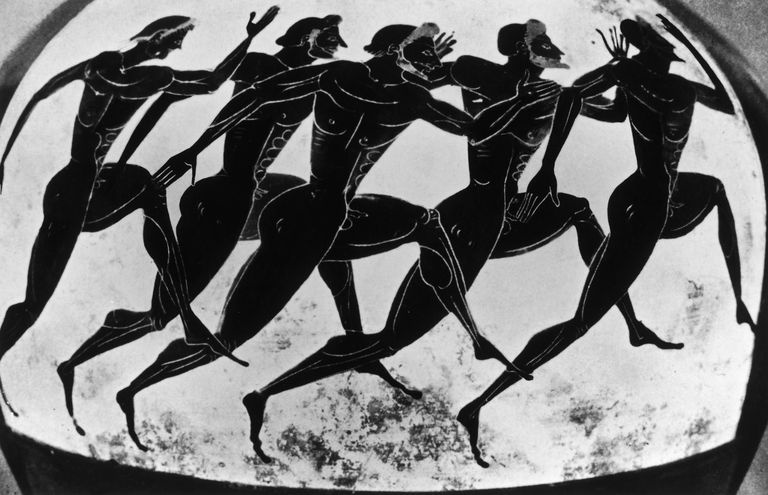
To adopt a standpoint outside the action does not mean to be indifferent to the outcome (to the fate of the characters in a drama or the victor in an athletic contest) or that one is “neutral.” It does mean, however, that one is objective, striving for a comprehensive view; that one understands events in terms of their relation to the whole; and above all that one is committed to appreciating the quality of the action more than to supporting particular competitors.
Because political theory is theoretical in this sense, it has maintained an intimate relationship with philosophy. It has used the methods of philosophical inquiry, but it has also assumed what Friedrich Nietzsche called “the prejudices of the philosophers.” The most important prejudice of philosophy is the claim of the superiority theoretical knowledge itself, not only to other forms of knowledge but to all other activities as well: thus Pythagoras not only likens philosophy to spectatorship but, even more importantly, he insists that the bios theoretikos is the best way of life, largely because the philosopher’s choices are governed by what reason tells him is true, just, or good by nature, while others are driven by the pursuit of wealth and fame simply because these are highly esteemed by common opinion.
The political theorist, then, holds that we best understand political life not by participating in it, but by taking up the spectator’s relationship to it, bringing to bear on it a perspective that is distanced and comprehensive rather than partial or partisan.
Pythagoras is thought by some to be the originator of this idea of contemplation as the best life, but it is more fully developed in Plato and Aristotle. In the Nichomacean Ethics, Aristotle defines contemplation as the highest life because it is the most divine:
If reason is divine … in comparison with man, the life according to it is divine in comparison with human life. But we must not follow those who advise us, being men, to think of human things, and, being mortal, of mortal things, but must, so far as we can, make ourselves immortal, and strain every nerve to live in accordance with the best thing in us. (Aristotle, Nicomachean Ethics 1177b.)
In the Metaphysics, Aristotle argues that contemplation is the activity of the Prime Mover.

Plato (in the Theaetatus) has Socrates argue for the spiritual superiority of the theoretical or philosophical life:
[T]he leaders in philosophy … [f]rom their youth … have never known the way to the market place or law court or Council Chamber or any other place of public assembly; they never hear a decree read out or look at the text of a law. To take any interest in the rivalries of political cliques, in meetings, dinners, and merrymakings with flute girls, never occurs to them even in dreams. Whether any fellow-citizen is well- or ill-born or has inherited some defect from his ancestors on either side, the philosopher knows no more than how many pints of water there are in the sea. He is not even aware that he knows nothing of all this, for if he holds aloof, it is not for reputation’s sake, but because it is really only his body that sojourns in his city, while his thought, disdaining all such things as worthless, takes wings, as Pindar says, “beyond the sky, beneath the earth,” searching the heavens and measuring the plains, everywhere seeking the true nature of everything as a whole, never sinking to what lies close at hand. (Plato, Theaetetus 173c-e.)
As Socrates makes clear, the theorist is interested in “viewing” or “contemplating” not just anything, but essences: “the true nature of everything as a whole, never sinking to what lies close at hand.”
An argument about politics is theoretical, then, if it offers a comprehensive, systematic, and general account of the nature, purpose, and value of political life. But how does one achieve this in politics? Given the way we have defined the terms “political” and “theory,” it would seem that there is a very strong sense in which the phrase “political theory” is incongruous and even oxymoronic.
“Politics,” we said, refers to assertions and actions that are publicly relevant because they deal with matters of concern to the entire community. But that means that what matters in politics are opinions, views, and perspectives on worldly matters of fleeting and transitory relevance – that what matters in politics is invariably what seems to matter to those with a stake in the community.
The theorist, however, is interested not in what merely seems to be the case, but in the truth of what actually is as such, regardless of what a given community somewhere, sometime takes to be true. When Pythagoras says that the philosophers hunt for truth, he means truth with a capital “T”: not just well-established facts or powerful arguments but timeless truths, fundamental realities, the basic, unchanging, underlying nature of objects of experience, about which we form changing opinions and beliefs: Idea, Spirit, God, Substance, Matter, Physical Laws, Mathematical Relations, etc. The worlds created through political action, on the other hand – through what concrete individuals and groups say and do – consist of nothing but changing appearances and opinion. How, then, can there be such a thing as a political theory?
Traditionally, political theorists have responded to the seemingly ephemeral world of politics by attempting to define it in relation to some more basic, unchanging purpose, order, or truth, either of human, divine, or natural provenance. Behind the apparent chaos of conflicting wills and opinions that comprise politics lies something more solid and reliable: a law or principle that both explains why politics is as it is and, more importantly, suggests normative rules or guidelines that define the proper shape of political life.
The theorist will argue, for example, that a particular form of political regime is necessary in order to establish a divine order, natural truth, or moral imperative, or some human need, capacity, or purpose. Thus, many political theorists have sought to elaborate a conception of human nature, and on that basis to specify the appropriate institutional political order or constitutional regime for a being of that nature. The political theorist frequently takes advantage of his or her freedom from direct political partisanship, then, to be critical of established regimes and settled institutional arrangements, in the name of more essential truths as revealed by the theory.
The theorist can do this in virtue of her spectatorial position vis-à-vis direct political action: because the theorist plays no assigned role, she is free to depart from long-established standards and widely-held opinions in order to formulate wholly new standards by which political actors are to be judged. Like Plato’s philosopher who leaves the shadowy cave and glimpses the sun, the theorist seeks to transcend “mere” opinion and to acquire a knowledge of politics grounded in what is really true rather than in commonly held beliefs.
As one example of the theoretical approach to politics, consider the venerable concept of “natural law,” variants of which play essential roles in both classical and modern political theory. A good statement of it is found in Cicero’s Republic:
True law is right reason in agreement with nature; it is of universal application, unchanging and everlasting; it summons to duty by its commands, and averts from wrongdoing by its prohibitions. And it does not lay its commands or prohibitions on good men in vain, though neither have any effect on the wicked. It is a sin to try to alter this law, nor is it allowable to attempt to repeal any part of it, and it is impossible to abolish it entirely. We cannot be freed from its obligations by senate or people, and we need not look outside ourselves for an expounder or interpreter of it. And there will not be different laws at Rome and at Athens, or different laws now and in the future, but one eternal and unchangeable law will be valid for all nations at all times…. (Cicero, Republic III.22.)
Cicero’s character Laelius is making the case that there is more to life than pursuing your interests, and he appeals to a distinction between conventional laws (rules of conduct agreed to by humans, which change from place to place and time to time and may be just or unjust, wise or foolish), and unchanging, universal natural law, which is justice itself. A political regime should conform, as far as possible, to the true natural law, whose dictates are found not in the opinions of legislators but are instead revealed by “right reason.” If “right reason” can supply us with an “eternal and unchangeable law … valid for all nations and all times,” we can take up a genuinely theoretical relationship to politics, judging the justice of regimes and of proposals for reform in terms of a standard much more solid and reliable than the narrow and shifting interests expressed in public opinion.
As Cicero says elsewhere:
[T]he Chief Good consists in applying to the conduct of life a knowledge of the working of natural causes, choosing what is in accord with nature and rejecting what is contrary to it. (Tusculan Disputations IV.7.)
[H]e who is to live in accordance with nature must base his principles upon the system and government of the entire world. Nor can anyone judge truly of things good and evil, save by a knowledge of the whole plan of nature. (De Finibus III.9.)
The distinction between conventional and natural law, the superiority of natural law, and the utility of a knowledge of natural law for political reflection all go back to the Stoics (in the passages I quoted, Cicero is characterizing Stoic views), and they play crucial roles in Plato’s and Aristotle’s political theories as well.
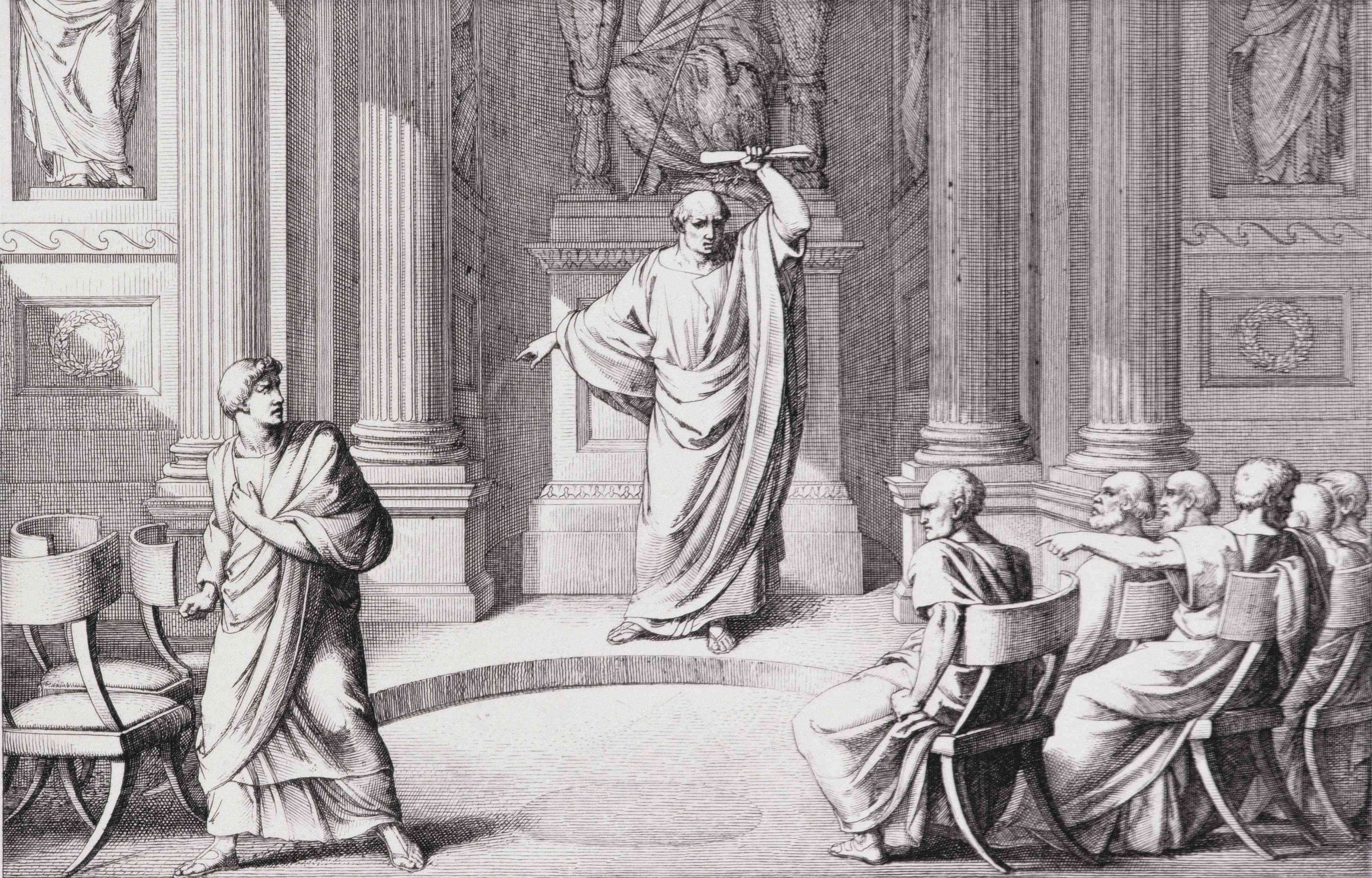
For Plato, there is a true Form of the Good or the Just that exists by nature not human opinion, is knowable through philosophical reflection, and serves as the basis for political action, whose raison d’être consists in bringing this Good into existence. We find the idea in the Christian thinkers Augustine and Aquinas, where natural law becomes the Christian God’s will. Because the will of God is absolute, Augustine can appeal to the true laws promulgated by God not only to discern the best political regime (to put it crudely, one that keeps man’s corrupt desires under control while the Church tends to his soul), but even to deny that pagan cities enjoy a genuinely political life at all:
Now in serving God the soul rightly commands the body, and in the soul itself the reason which is subject to its Lord God rightly commands the lusts and other perverted elements. That being so, when a man does not serve God, what amount of justice are we to suppose to exist in his being? For if a soul does not serve God it cannot with any kind of justice command the body, nor can a man’s reason control the vicious elements in the soul. And if there is no justice in such a man, there can be no sort of doubt that there is no justice in a gathering which consists of such men. (Augustine, The City of God XIX.22.)
For Augustine, justice consists in the enforcement of the divinely ordained hierarchy established by God and knowable by human reason, which mandates the strict subordination of the lower (the body) to the higher (the soul and ultimately God). God rules over an individual’s reason, which rules over his or her appetites. In society the same arrangement ought to prevail, the purpose of politics being to ensure that it can.
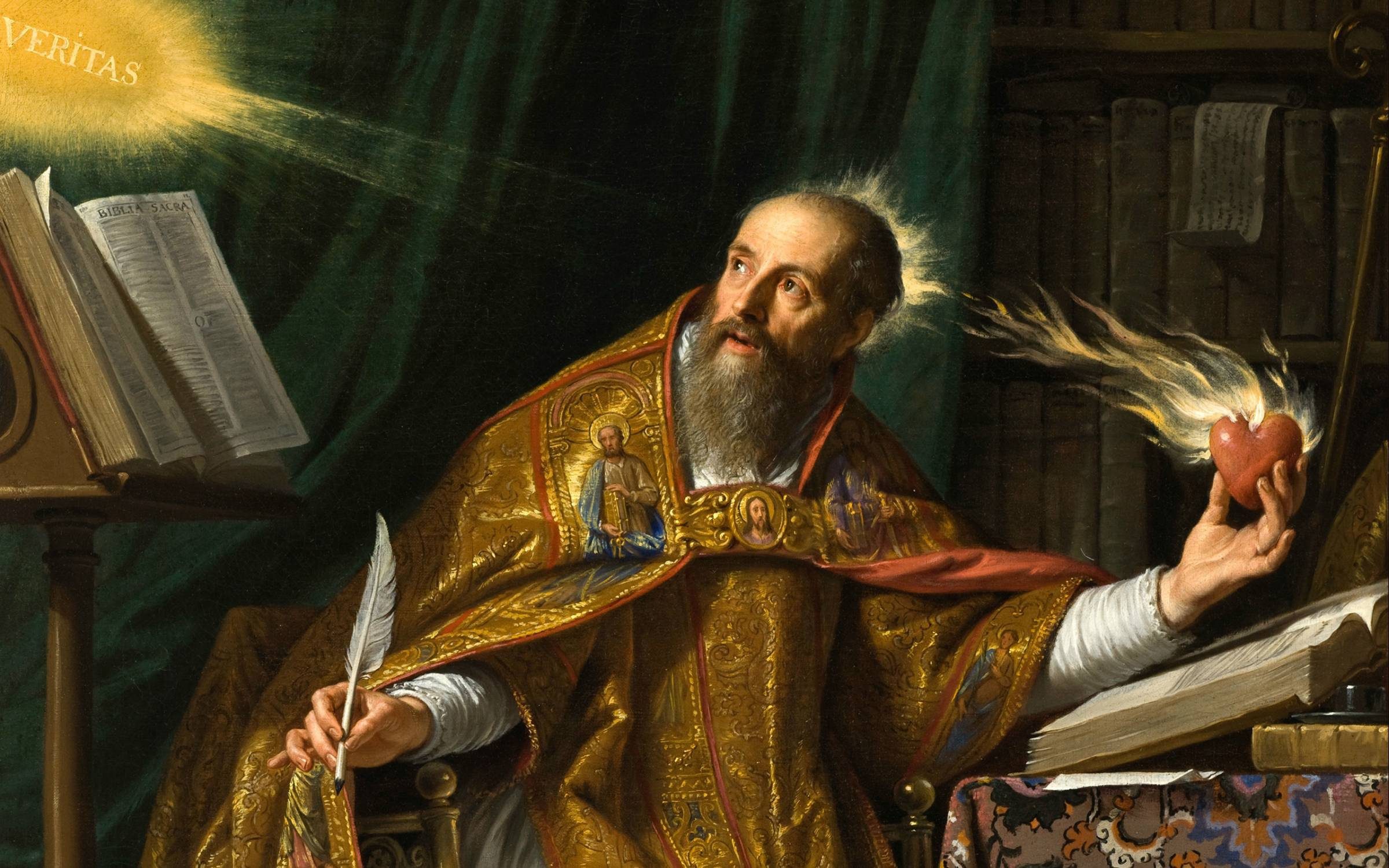
Aquinas also invokes a version of natural law, again arguing that it derives from God’s “eternal law”:
Since everything that is subject to divine providence is regulated and measured by the eternal law, … it is evident that all things participate in the eternal law in a certain way because it is imprinted upon them through their respective inclinations to their proper actions and ends. Rational creatures are under divine providence in a more excellent way than the others since by providing for themselves and others they share in the action of divine providence themselves. They participate in eternal reason in that they have a natural inclination to their proper actions and ends. Such participation in the eternal law by rational creatures is called the natural law. (Aquinas, Summa Theologica I-II q91 a2.)
Because they reason, individuals can become aware of their true purpose, which is to understand God’s divine stewardship and the purposes He has given us. The task of government is to legislate in accordance with God’s eternal law – again, to actualize or effectuate an everlasting, unchanging order that is graspable by reason, which is itself akin to divine providence.
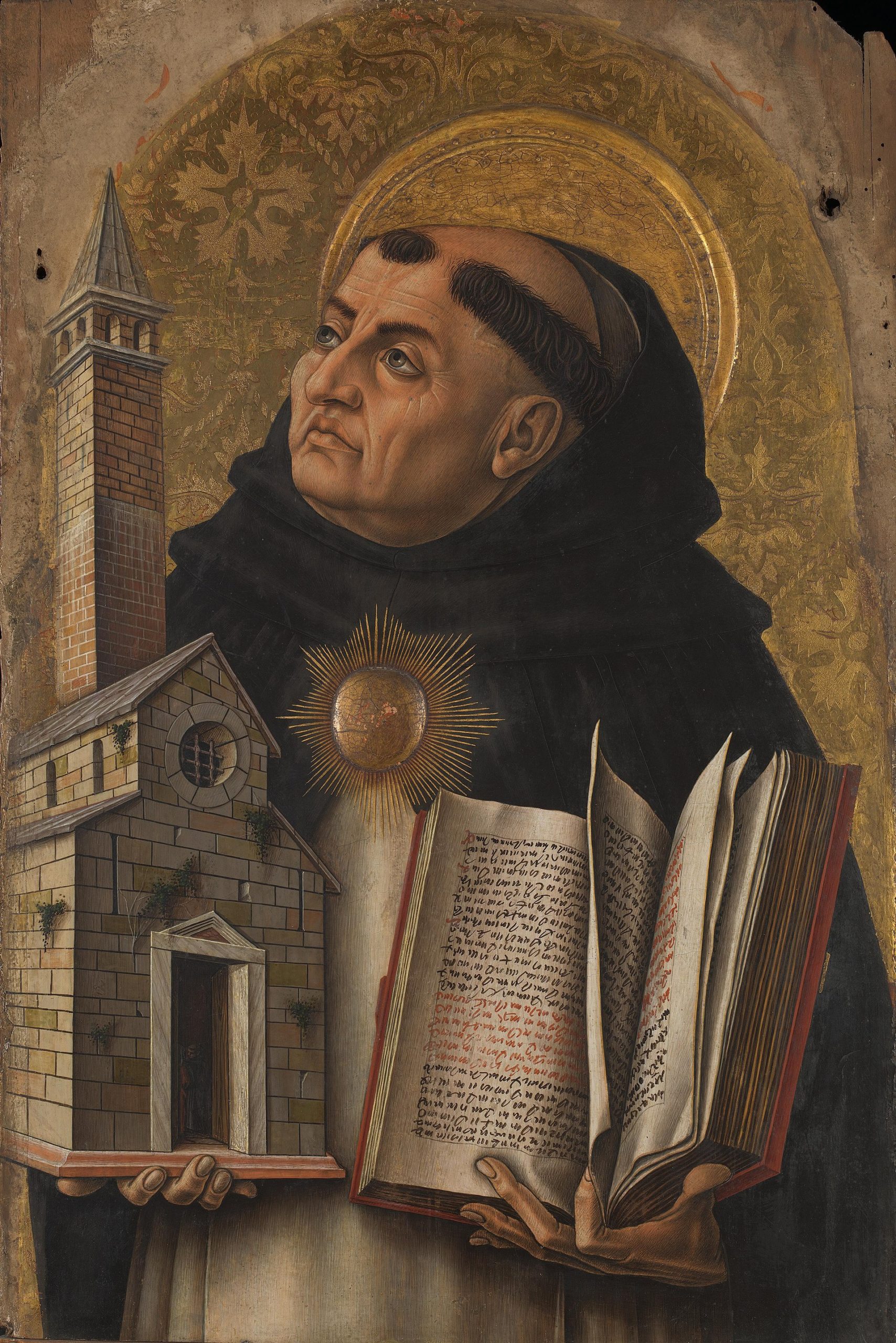
Although Aristotle, Cicero, Augustine, and Aquinas differ dramatically in many ways, they share an important assumption: the task of the political theorist is to “ground” politics, in Cicero’s words, by discovering “one eternal and unchangeable law … valid for all nations and all times,” a principle of justice or law that dictates to human beings their True, Essential identity and purpose – a purpose that, being essential, is fixed and unchanging and hence can become the object of a genuinely theoretical knowledge, knowledge of a timeless truth.
In the Platonic and Christian tradition, the true essence of the individual was said to be the “soul,” whose vocation was to contemplate the Truth (Plato) or conform to God’s will (Augustine, Aquinas). The proper political regime was one that made it possible to take care of one’s soul in this way by subordinating the passions, appetites, or (with Christianity) the perverted lusts of the body to the search for Truth or the pursuit of reconciliation with God. The proper regime is one that allows humanity to realize its essential nature – its soul or spirit, not body. An evil regime is one that, by exercising tyrannical rule over its citizens or by preventing them from pursuing the true faith, affronts and suppresses human nature itself.
The reason that human beings could be said by nature to possess essential purposes was that the cosmos was considered to be an ordered whole whose various elements served discrete functions, purposes, or ends, all contributing to a “final end” or ultimate purpose of the universe. This is the Aristotelian (but also Christian), pre-Copernican universe, composed of distinct but harmoniously related substances all governed in their movements by the unmoved mover, or God.
In such a universe, we explain why things are as they are by reference to their purpose or their contribution to the whole. Freedom consists in not being prevented from fulfilling your natural, preordained purpose (contemplating the truth, reconciling with God). For this reason, nature and freedom are congruent: just as all things in nature are as they are in order to fulfill some end that contributes to the shape of the whole, so do humans have a purpose which they seek to fulfill (for the philosophers and Christians, a True, essential purpose).

In the modern, post-Newtonian world, however, nature is not a realm of essential ends or purposes, but consists merely of atoms (or perhaps quarks) in the void, where they obey mechanical laws without purpose or goal. Explanation no longer means showing why something behaves as it does (what it is for) but how it behaves as it does (how it works). Removing purposiveness from the cosmos thus eliminates the natural basis of meaningful human action, which must then be relocated – if not in nature, where? The modern answer is: in Man himself, or more especially in his will (his ability to determine for himself how he is to conduct himself, his capacity for self-legislation or self- determination), which will now become the ground of human purposiveness and freedom: humans rely neither on nature nor God nor tradition as the source of principles of action, but rather on their capacity literally to produce themselves.

An important result of this change is a transformation in what political theorists mean when they discuss “human nature” or “natural law” or “the law of nature.” Where classical and Christian political theorists held up an essential, exemplary human purpose or identity that could serve to regulate conduct, the pursuit of which would be facilitated by the proper political regime, for some modern theorists human nature is to be described on the basis of what is typical, so that “human nature” refers not to an ideal norm to be effectuated or realized but to what observation tells us about how humans typically behave, moving from human nature as a statement of the human essence to human nature as a statement of a statistical regularity.
As a genre or tradition, political theory is distinguished from both political thought and political discourse. A United States Senator who takes the floor to argue in favor of a piece of legislation is engaging in political discourse because he is debating a matter of concern to the entire polity, but what he or she says may have little or no theoretical content. George Orwell, in Homage to Catalonia, reflects on the significance of the Communist suppression of the Spanish anarchist revolution for international socialism. But although his reflections are less partisan than what one typically hears in the Senate, they do not have the characteristics I singled out: systematic argument about the nature, meaning, and worth of political life such as one finds in Plato, Augustine, Hobbes, Locke, Rousseau, Kant, and Marx. Neither Noam Chomsky nor Jordan Peterson is a political theorist in the traditional sense of the phrase.
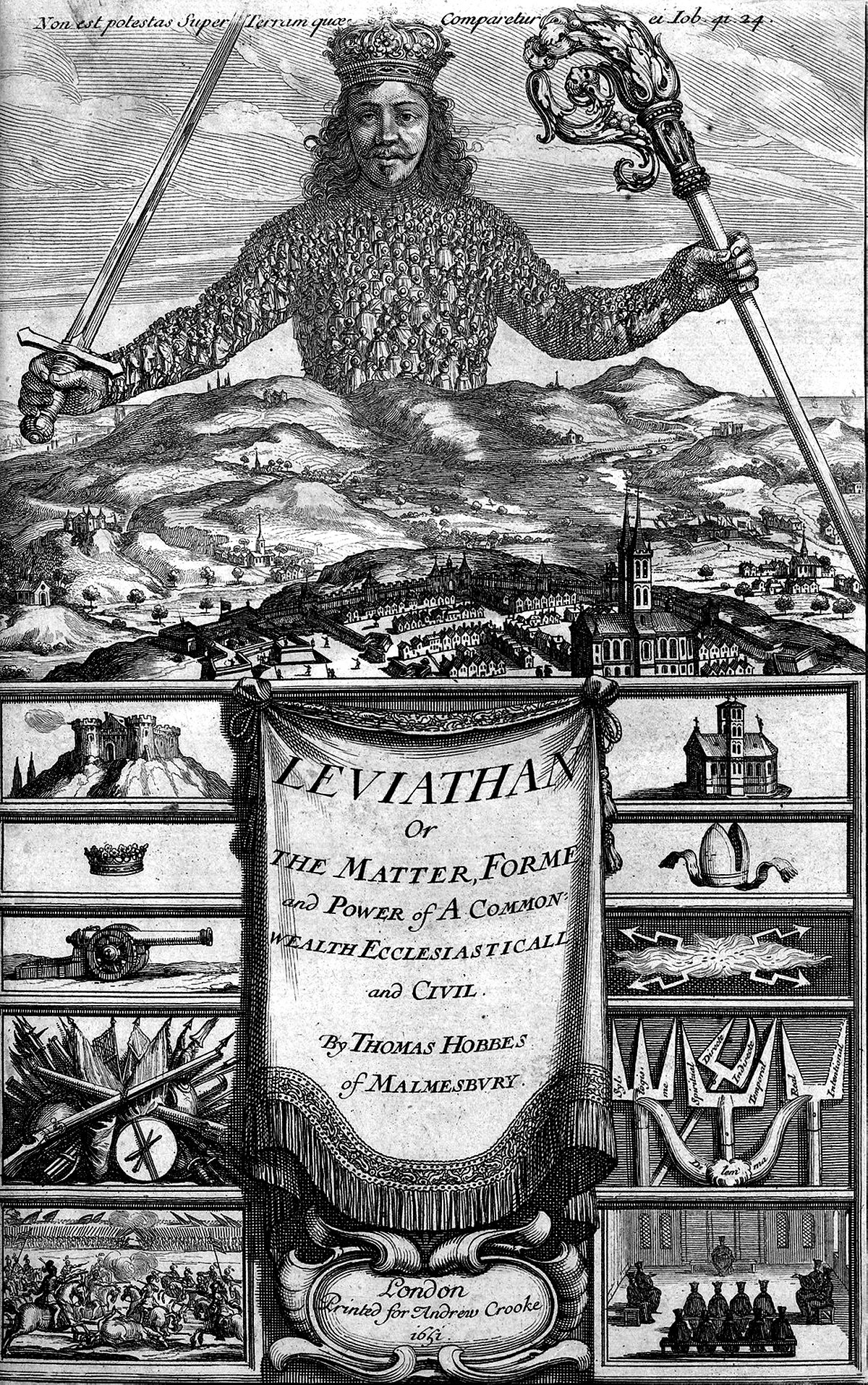
That is not to say that political theory can only take the form of a philosophical treatise. It often does, but it also takes the form of history (Thucydides), travel literature (Tocqueville), advice manuals (Machiavelli), drama (Machiavelli again, Shakespeare, and Plato was really a dramatist), and hybrid genres of all sorts.
Political theory happens when an author attempts to convey something comprehensive and impartial about the nature of public life, but this effort can adapt to its needs a variety of literary forms: philosophical argument, dialogue, drama, history, fiction, and much more.
Below, the people of Athens are crowned by Democracy.
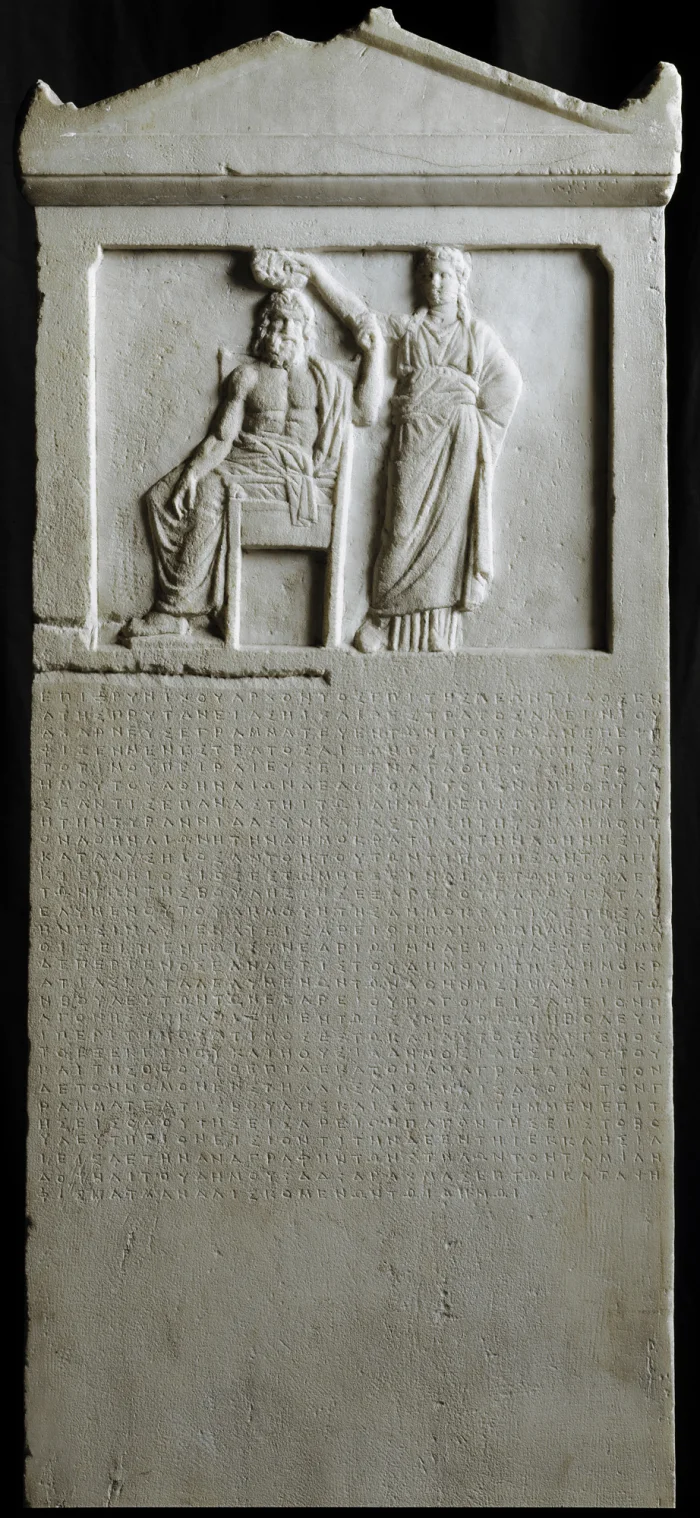 The inscription states the law against tyranny passed in Athens in 336 B.C.
The inscription states the law against tyranny passed in Athens in 336 B.C.

